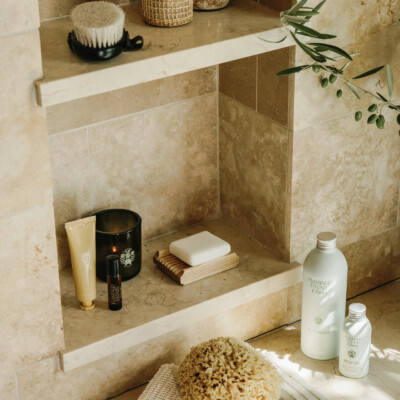I’ve always considered myself a “non-confrontational person.” Those of us who self-identify in that way often take pride in the label, as though we value peacefulness more than most. Though I do prize peace, I’ve also learned over the years, how to use conflict in a relationship and confrontation as a tool that works for me and my partner.
A real turning point came when I read Daring Greatly, by Brené Brown. In it, she talks a lot about people-pleasing, and upon first glance, I never would have called myself a people-pleaser. I’m a free thinker, an individualist (where my enneagram 4s at?!), and a creative. In my mind, those qualities did not exist with people-pleasing, but as I dug deeper within myself I realized that I have a deep fear of disappointing someone or doing anything that might be frowned upon.
I realized that by shying away from conflict and confrontation I was buying a seat at the people-pleasing table—a table which was no longer serving me.
Through years of self-reflection and as working as a substance abuse counselor (where I encourage my clients to look at what is not serving them and then confront it), I’ve learned a few tricks of the trade for setting boundaries, fighting fair, and making conflict work for you.

1. Sit in the discomfort.
I am a firm believer that feelings are just feelings. Society has taught all of us that happiness, lightness, and comfort are things to hold as “best”. I’m here to offer great news: all emotions are equal! That joyous news should validate that when you feel sad or angry or lonely or tired, those are all fair and true. When you lean into a feeling of uneasiness, you get to show up as your true self. How many of us have started a confrontational conversation with “I’m so sorry to bring this up”, ”I don’t want to make you feel bad”, “This is really no big deal.” When you do this, it is not authentic.
Recognize that what you are about to say might cause feelings of discomfort in you or your partner, but that those feelings are valid.
Try these conversation starters instead:
(Note: I believe that “and” is a confrontation’s best friend. Instead of saying “I’m sorry, but…” try “I love you, and…”)
- “I love you, and this is something that has been weighing on my heart.”
- “I value that I can speak honestly with you, and I want to talk with you about…”
- “Our relationship is important to me, and I would really like to talk through a few things.”
Remember that the conversation does not have to end neatly. If the conversation ends with feelings of sadness or discomfort, that is valid, and it can be revisited when you’re ready.

2. Go to bed angry… If you want to.
How many of us were told to “never go to bed angry?”. While I’m not endorsing going to bed in a rage, it is also okay to take your time to process emotions. When we feel a sense of urgency to resolve things, we are not allowing ourselves the space to work through our inner dialogue. Additionally, how many times have you had a full night of sleep and then seen things from an entirely different perspective the next morning?
For me, confrontation can be a true source of anxiety, and there is no better antidote in my opinion to anxious feelings than rest. Taking time and space can be a true gift to yourself to better understand your feelings. I do think that within this, it can be helpful to tell your partner, “I am hoping that sleep will give me some clarity on this issue—can we talk more about it in the morning?”. It can be hurtful to leave someone hanging, and it is so important to communicate our needs and wants before taking a rest from a conflict.
 3. Set your intentions.
3. Set your intentions.
I will never forget the first time that I went to a yoga class and the teacher told us all to “set your intentions for class.” In my mind, I thought “Okay, lady. My intention is to stretch.” Over the years I have learned how powerful the idea of intention is. These days when I go to a yoga class, I think “My intention is worthiness, peacefulness, love, etc.” It is amazing how often when I leave I feel deeply rooted in those feelings.
Our thoughts are so powerful, and this intention-setting works just as well with conflict. Before bringing something confrontational up with someone, I often think “What is my intention with this conversation?”. I will admit that this takes some practice, but now I know almost instantly what the answer is. If what rises in me is that this is coming out of a place of malice, jealousy, or meanness, I either abandon the confrontation altogether or instead of seeking answers in the other person, I try to look at my own thoughts and actions. The answer in those types of things almost always lies within. But if I ask myself that question and what rises in me is that I have been genuinely hurt by someone else’s words or actions, I am feeling belittled, dismissed, like my boundaries have been ignored, etc., I move forward with it.
I set an intention for a conversation that might look like this: “My intention is for us both to feel seen and loved.” I know that this might sound a little silly, but I think it can be helpful to even SAY that intention to your partner.
Using one of the conversation starters above, a great way to begin might be: “I love you and this is something that has been weighing on my heart. My intention in this is for us both to feel seen.” Doesn’t that feel better than “Every day I pick your socks up off the floor, and I feel like you don’t care about my time?”.

4. Pick your battles (and stop playing the blame game).
Blaming doesn’t work. That sock example from above? It is from my real life. My husband has thrown his sweaty gym socks on the floor every morning for six years. I have said approximately 20,000 times “Stop throwing your socks on the ground. I have to pick them up when you do that.” This has affected zero change. Does this mean that my husband doesn’t love me and doesn’t value my time? No. Typically when he is throwing those socks on the ground, he is headed to get our one-year-old out of her crib to give her a bottle and start reading Planting a Rainbow about 20 times.
I can choose to focus on the socks, or I can choose to focus on how much he loves and cares for our daughter. The choice is literally that simple. It takes me about half a second to throw the socks into the laundry basket. This is not drastically affecting my life. What drastically affects our lives is when we start seeing things through a lens of resentment and blame.
When we nag on small things, it negates when we want to actually confront something truly important to us.
I would much rather use the breath from “Pick your socks up” on “How are you feeling about your day today?”. The socks are not important. Relationships are important. Conflict can help your relationship deepen, it can help your relationship grow, but blaming and nagging will slowly chip away at what is good and real.

Learning how to embrace confrontation as a tool and not a weapon takes practice. If you want to reap the rewards of a deep and mature relationship, part of that is learning how to speak up for yourself unapologetically. The payoff from this is so deep, but of course, there are growing pains.
Sit in the discomfort and enjoy the sometimes bumpy road to true healthy communication.





